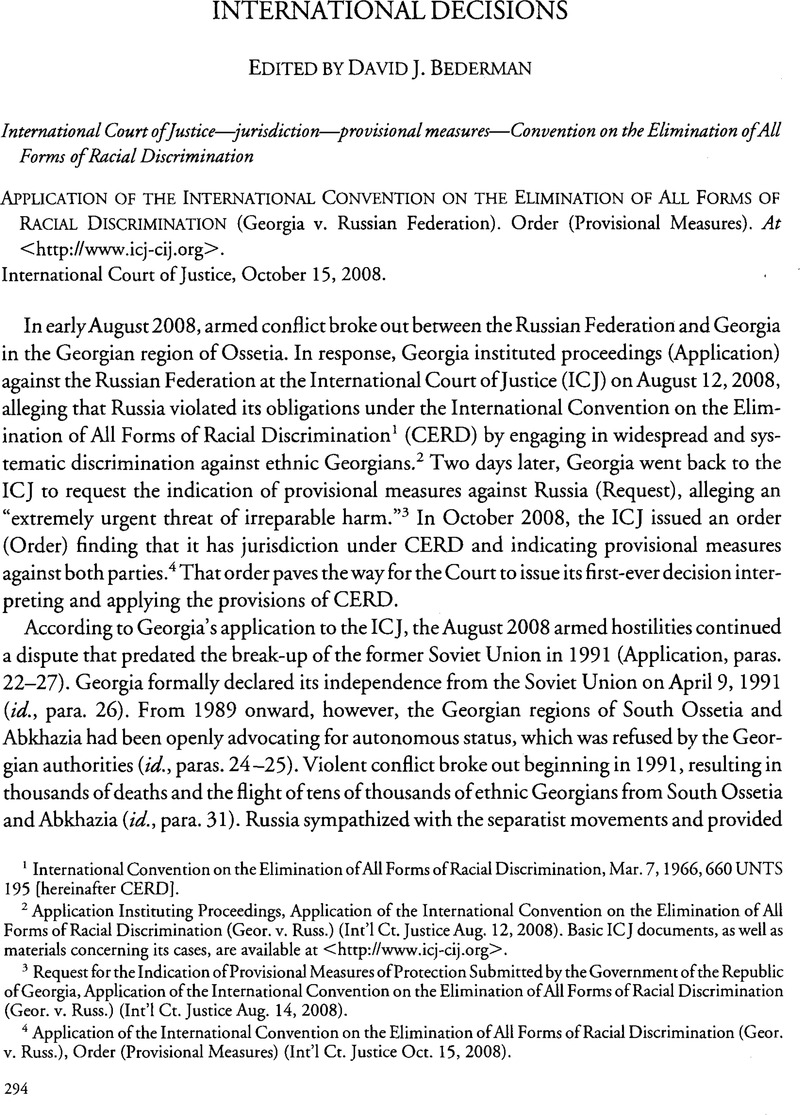Published online by Cambridge University Press: 27 February 2017

1 International Convention on the Elimination of All Forms of Racial Discrimination, Mar. 7, 1966, 660 UNTS 195 [hereinafter CERD].
2 Application Instituting Proceedings, Application of the International Convention on the Elimination of All Forms of Racial Discrimination (Geor. v. Russ.) (Int’l Ct. Justice Aug. 12, 2008). Basic ICJ documents, as well as materials concerning its cases, are available at <http://www.icj-cij.org>.
3 Request for the Indication of Provisional Measures of Protection Submitted by the Government of the Republic of Georgia, Application of the International Convention on the Elimination of All Forms of Racial Discrimination (Geor. v. Russ.) (Int’l Ct. Justice Aug. 14, 2008).
4 Application of the International Convention on the Elimination of All Forms of Racial Discrimination (Geor. v. Russ.), Order (Provisional Measures) (Int’l Ct. Justice Oct. 15, 2008).
5 While the Court did not expressly state what language it relied on in reaching this conclusion, it is likely that the Court viewed Article 11 ‘s language as permissive rather than mandatory because the article states that a party “may” bring a dispute before the Committee, and not that it must do so. CERD, supra note 1, Art. 11.
6 Parties have frequently successfully requested the indication of provisional measures at the ICJ. See, e.g., Request for Interpretation of the Judgment of 31 March 2004 in the Case Concerning Avena and Other Mexican Nationals (Mexico v. United States of America) (Mex. v. U.S.) (July 16, 2008); Application of the Convention on the Prevention and Punishment of the Crime of Genocide (Bosn. & Herz. v. Yugo.), 2003 ICJ Rep. 3 (Apr. 8); Armed Activities on the Territory of the Congo (Dem. Rep. Congo v. Rwanda), 2002 ICJ Rep. 219 (July 10) (all provisional measures orders). And while not as common, it is not unprecedented for the ICJ to order provisional measures against both parties. See, e.g., Anglo-Iranian Oil Co. (UK v. Iran), Order (Interim Measures of Protection), 1951 ICJ Rep. 89, 93 (July 5).
7 See, e.g., C. J., Chivers & Ellen, Barry, Accounts Undercut Claims by Georgia on Russia War, N.Y. Times, Nov. 7, 2008, at A1 Google Scholar; Christopher, Waters, Russia, Georgia and the Use of Force, Jurist Forum (Aug. 14, 2008), at <http://jurist.law.pitt.edu/forumy/2008/08/russia-georgia-and-use-of-force.php>Google Scholar; Russia Recognises Georgian Rebels (Aug. 26, 2008), at <http://news.bbc.co.uU2/hi/in_depth/7582181.stm>>Google Scholar.
8 See Rebecca M., Wallace & Diego, Quiroz, Refugees and Internally Displaced: A Challenge to Nation-Building, 60 Me. L. Rev. 409, 417 (2008)Google Scholar.
9 Legal Consequences of the Construction of a Wall in the Occupied Palestinian Territories, 2004 ICJ Rep. 136, para. 106 (July 9).
10 During the drafting of the Convention, the United States proposed that states be prohibited from encouraging, advocating, or supporting discrimination “through police action or otherwise.” 1963 U.N.Y.B. 333, 334. The initial vote was overwhelmingly in favor of the United States’ proposal, indicating that the drafters thought that the Convention could apply to the use of force. See id. However, it appears from the comments of the delegates to the Sub-commission on Prevention of Discrimination and Protection of Minorities that the proposed language was later dropped not because the delegates thought the use of force should not be covered, but because they did not want to include any language that could be limiting or confusing. UN Econ. & Soc. Council [ECOSOC], Sub-comm’n on Prevention of Discrimination & Prot. of Minorities, Summary Records of the 412th Mtg. at 7, UN Doc. E/CN.4/Sub.2/SR.412 (1964). The final CERD language regarding states’ obligations in Article II is the broadest possible: “Each State Party undertakes to engage in no act or practice of racial discrimination” (emphasis added).
11 See, e.g., Armed Activities on the Territory of the Congo (New Application: 2002) (Dem. Rep. Congo v. Rwanda), para. 1 (Int’l Ct. Justice Feb. 3, 2006).
12 See, e.g., South West Africa (Eth. v. S. Afr.; Liber, v. S. Afr.), 1966 ICJ Rep. 6 (July 18).
13 See Natan, Lerner, The U.N. Convention on the Elimination of all Forms of Racial Discrimination 28 (1980)Google Scholar.
14 Georgia’s position may also find support in the Convention’s travaux préparatoires. Of the three draft texts considered by the Sub-commission on Prevention of Discrimination and Protection of Minorities, two contained multiple references to a state’s obligations “within its territory” in Articles II and III. Compare ECOSOC, Sub-comm’n on Prevention of Discrimination & Prot. of Minorities, Summary Records of the 409th Mtg., UN Docs. E/CN.4/Sub.2/L.308 (1964) (Abram draft), E/CN.4/Sub.2/L.309 (Calvocoressi draft), & E/CN.4/Sub.2/L.314 (Ivanov/Ketrzynski draft). However, the text of Article II as ultimately adopted contained no reference to a state’s territory, and Article III was altered to refer to a state’s jurisdiction rather than its territory. The U.S. delegate suggested that the deletion of the words “within its territory” would “have the advantage of implying that the responsibility of the State extended to all areas in which it exercised authority.” ECOSOC, Sub-comm’n on Prevention of Discrimination & Prot. of Minorities, Summary Records of the 416th Meeting at 5, UN Doc. E/CN.4/Sub.2/ SR.416 (1964).
15 Committee on the Elimination of All Forms of Racial Discrimination, Concluding Observations: Georgia, para. 4 (Apr. 27, 2001), UN Doc. CERD/C/304/Add.120.
16 Briefing in this case is scheduled to continue into 2010, so it will be some time before there is any resolution on the merits.